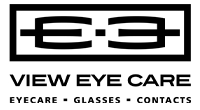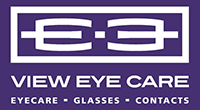Does Wearing Glasses Cause Your Prescription to Get Worse?
One common question that our patients have is whether wearing glasses makes their prescription get worse over time. The short answer is no—glasses don’t make your vision worse. However, people’s vision does tend to change over time, and it also tends to get worse as they get older. If your prescription is changing, it’s most likely due to natural factors, however, there are certain conditions that can cause more rapid changes to one’s prescription.
If you notice changes in your eyesight, you should book an eye exam. We’ll have a look at your eyes and tell you if your prescription needs updating. We carry a wide range of exciting and fashionable frames & lenses, so there’s almost certainly something that matches your style.
How Do Glasses Work?
Glasses correct refractive errors by altering how light enters the eye.
Ideally, the eye causes light to fall directly on the retina—a tissue at the back of the eye that sends visual signals to the brain. In people with refractive errors, the shape of the eye or certain parts of the eye, cause light to fall slightly in front of or behind the retina, thereby resulting in blurry vision.
Common refractive errors include:
- Nearsightedness (Myopia): When the refractive error of your eye causes light to fall in front of your cornea. Results in difficulty seeing objects at a distance.
- Farsightedness (Hyperopia): When the refractive error of your eye causes light to fall behind your cornea. Results in difficulty seeing objects up close.
- Astigmatism: When your eye is irregularly shaped, resulting in blurry vision at all distances.
- Presbyopia: An age-related condition that makes it hard to change your focus from far to close-up objects.
Why Do People Think Glasses Make Vision Worse?
There are several factors contributing to this myth.
Your Eyes Adapt to Your Glasses
When you wear your glasses, you see the world around you much more clearly. Conversely, when you take them off, your normal vision may seem much worse in comparison. But nothing actually changed—except for your reference point for acceptable vision!
Prescription Changes Over Time
Our vision changes naturally as we age. Often, it gets worse. Refractive errors like myopia also tend to progress over time, but this would happen even if you didn’t have glasses.
Increased Awareness of Vision Problems
Before you started wearing glasses, you might not have realized just how blurry your vision actually is. Once you get used to seeing the word with sharp, clear eyesight, your uncorrected vision might seem to you to be worse than before.
Does Wearing an Incorrect Prescription Harm Your Eyes?
Wearing the wrong prescription won’t cause permanent damage, but it can cause some inconvenient symptoms. Some of these include:
- Eye strain
- Headaches
- Blurry vision
- Dizziness or nausea
If you’re experiencing such symptoms, visit us at View Eye Care for a comprehensive eye exam to check that your prescription is working for you.
Do Eyes Become Dependent on Glasses?
Many people believe that, if they start wearing glasses, they’ll become dependent on wearing them. However, this isn’t actually true.
Glasses don’t train or weaken your eyes, and they don’t change your eyes’ anatomy. They simply correct refractive errors.
If you feel reliant on your glasses, it’s likely because they help you see more clearly & comfortably than you did with uncorrected vision. There’s a lot to be said for seeing clearly!

Preserving Your Vision
While glasses don’t make your eyes worse, there are still ways to maintain the health of your eyes. Here are some simple but effective tips:
- Follow the 20-20-20 Rule. Every 20 minutes, look at something 20 feet away for 20 seconds. This gives your eyes time to relax.
- Eat a nutrient-rich diet. Foods high in vitamin A, C, and E, or omega-3 fatty acids, can all support eye health. Leafy greens, carrots, and fish are great examples.
- Wear sunglasses. Protecting your eyes from UV rays can prevent long-term damage and lower your risk of developing certain conditions.
- Stay hydrated. Dehydration is one cause of dry eye, and may result in discomfort and/or blurred vision. Drink plenty of water to help keep your eyes lubricated.
- Reduce screen time. Too much screen time is a major cause of eye strain. Take regular breaks and make sure that you’re working in good lighting.
When Should You See an Optometrist?
If you experience any of the following symptoms, you should schedule an appointment:
- Frequent headaches
- Sudden vision changes
- Trouble seeing at night
- Eye strain or discomfort
Regular eye exams help us detect potential problems early. This, in turn, lets us deal with issues before they start to affect your health.
Can Eye Exercises Replace Glasses?
The myth that glasses can make your vision worse has prompted some people to believe that doing eye exercises can make your vision better. Unfortunately, this isn’t true. While eye exercises can help with eye strain and coordination of movements of the two eyes, they don’t fix refractive errors like myopia.
The easiest way to correct refractive errors is by wearing glasses or contact lenses.
Keep Your Vision Clear—Wear Your Glasses!
Wearing glasses doesn’t make your eyes worse. Glasses only change the way that light enters your eye, which allows you to see more clearly. If your prescription changes, it’s likely due to natural factors like aging and not a side-effect of wearing glasses.
Taking care of your ocular health, scheduling regular eye exams, and protecting your eyes from excessive strain are all good ways to protect your vision.
If you have concerns about your vision or think that you might need a new prescription, book an eye exam today. Our team at View Eye Care will answer your questions and empower you to make the best choices for your health.




